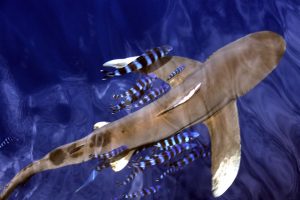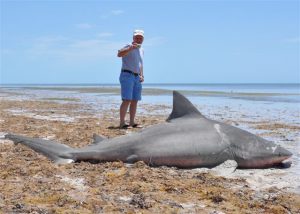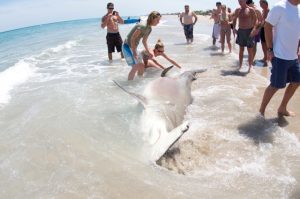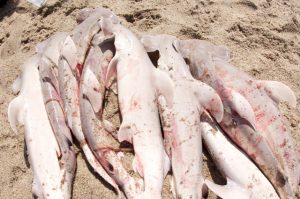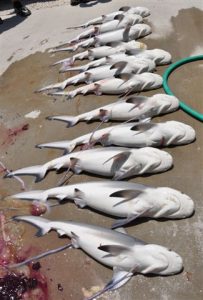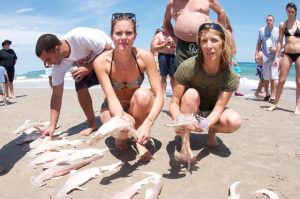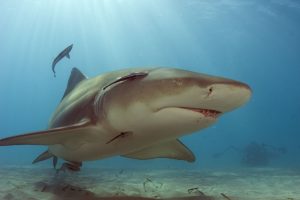New R.J. Dunlap Marine Conservation Program at
University of Miami Fosters
Ocean Science for Future Generations
Shark expert Hammerschlag to lead program to promote interest in research and conservation, provide hands-on learning opportunities for students

Photo by: Eric Cheng
MIAMI — January 18, 2010 — The University of Miami (UM) today announced the inauguration of the R.J. Dunlap Marine Conservation Program, a joint program of the Rosenstiel School of Marine & Atmospheric Science and the Leonard and Jayne Abess Center for Ecosystem Science and Policy. Named in honor of businessman and conservationist Richard James Dunlap, the program will focus on advancing ocean research through exciting hands-on field and virtual learning experiences for high school and university students.
“Our goal, in establishing this program is to honor the memory of my late husband, who was an avid outdoorsman and who had a keen interest in protecting the environment in the Florida Keys, which he came to love through the years,” said Marian Dunlap. “We hope to create a longstanding legacy that will help us to better understand what is happening with these precious resources and how we can sustain them in the 21st Century and beyond, so future generations can enjoy them as well.”
The Intersection of Science & Policy
The program enables UM to build upon its internationally recognized programs in marine and ecosystem science and foster innovative interdisciplinary approaches to emerging environmental issues. The Rosenstiel School offers one of the largest, most dynamic marine and atmospheric programs in the nation that will offer cutting-edge scientific support for the new program. The Abess Center, led by University of Miami Professor and National Geographic Emerging Explorer Kenny Broad, will provide support in the form of innovative initiatives that bridge the gap between hard science and environmental policy.
“We are very pleased that the Dunlap family recognizes the value of an interdisciplinary approach to complex environmental research,” said Donna E. Shalala, president of the University of Miami. “Because the R.J. Dunlap Marine Conservation Program lies squarely in the intersection between science and policy, it will provide students across the University of Miami, and high school students, including those in underserved populations, with access to field experiences that will foster intellectual curiosity and help to position them as effective environmental leaders for the future.”
Protecting the Marine Environment
Field and virtual expeditions will expose students and teachers from across the globe to the importance of oceans in our daily lives. Through the R.J. Dunlap Marine Conservation Program they will learn about the threats facing ocean resources and their adjacent coasts, and explore solutions for conservation. Educational opportunities will be tailored for those in land-locked communities, as well as those in underserved populations where there may not be a regular focus on ocean studies.
“Through these practical opportunities, regardless of where they are located, students will be able to experience the complex environmental issues that we need to address as a society,” said Roni Avissar, dean of the Rosenstiel School of Marine and Atmospheric Science. “We look forward to a long-term, productive partnership with the Dunlap family in the cause of environmental conservation, and are eagerly anticipating the results of this program in the form of science-based resource management decisions and scientific publications.”
A Proven Model
The new program will follow the model established by the wildly successful South Florida Student Shark Program (SFSSP), a collaborative, multi-disciplinary research and education program. Founded in 2006 by Dr. David Dié and Rosenstiel School graduate student Neil Hammerschlag, the SFSSP is a full-immersion program that focuses primarily on the study and conservation of Floridian shark species, encouraging students to take an active role in modern scientific education and research.
“Through this generous gift we will be able to expand the program to address other marine species, and reach new audiences around the world,” said Dr. Neil Hammerschlag, director of the R.J. Dunlap Marine Conservation Program. “One unique offering is our ‘Adopt a Shark’ program, which will enable us to track great hammerhead and bull sharks using sophisticated satellite tags that students will help to attach to live animals that will allow us to better understand their migratory routes and habits, which will assist us in creating stronger policies to protect these critically threatened species.”
Remembering R.J. Dunlap
Born in Wilmette, Illinois, Richard James Dunlap was the son of L.J. and Marie Dunlap. As a boy he had a family friend and entrepreneur who taught him how to fish and appreciate nature – a love that would expand to all outdoor activities and would persist throughout his life. In 1938, R.J.’s parents packed Dick into their car and drove from Illinois all the way down to Key West, Fla. This vacation in the Florida Keys created a special place in his heart for the chain of islands. Dick vowed to return, but did not do so until the 1970’s.
While in V5 Officers Training for the U.S. Navy during World War II, R.J. attended the University of Michigan and obtained his degree in Business Administration, he took a job with the Northern Trust Company of Chicago. After a period of time he went on to the University of Iowa and graduated with his degree in law. After Law School he was an insurance broker specializing in estate planning and group insurance.
In 1948, R.J. met a nursing student named Marian. Within a month, the goal-oriented R.J. courted and married her. They would be inseparable until the time of his death.
R.J. struck out on his own and founded Employee Benefit Plans in 1960, with Marian at his side. He was dubbed the “Father of Self-Insurance” by the Wall Street Journal, for bringing this business concept to the forefront – a concept that is still very popular today. Ever an astute businessman, R.J. used his knowledge of the industry to expand his business interests; he started a Surgery Center and had a Hobby Craft Factory, and before long he was serving on the boards of several companies, leaving his imprint on their operations.
An avid outdoorsman, R.J. founded and was president of the Minnesota Geese, which played a major role in Canadian goose repopulation throughout the Midwest. He also presided over the Pipe Lake Gun Club, to help promote the love of outdoors and protection of wetlands. R.J. spent many family vacations and hosted business conferences at Rainbow Bend in the FL Keys. It is here that he and his four children, Christopher, Kim, Leslie and Melinda, would explore the marine environment. He was also influential in inspiring the love of the ocean to his grandchildren through fishing, boating, snorkeling and diving.
In 1986, at the age of 60, R.J. passed away. But he left a strong legacy. Not only did he leave behind a cadre of profitable companies, but he left his imprint in terms of helping to create a more sustainable environment. Most importantly, however, his wife Marian, and four children, ten grandchildren and 6 great-grandchildren are a testament to his successful life, and they continue to carry out his dreams. Established through a founding donation from Marian Dunlap in honor of her late husband, the R.J. Dunlap Marine Conservation Program at the University of Miami now provides exciting opportunities for students to advance ocean conservation and participate in cutting-edge hands-on projects.
About the University of Miami The University of Miami’s mission is to educate and nurture students, to create knowledge, and to provide service to our community and beyond. Committed to excellence and proud of the diversity of our University family, we strive to develop future leaders of our nation and the world.

